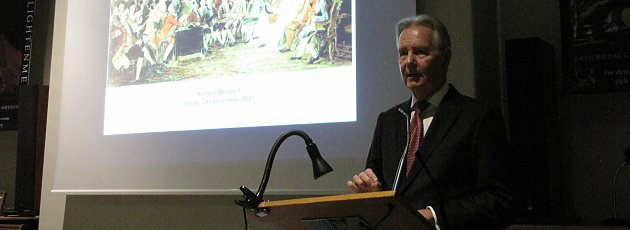Friday December 11th 2015. A year ago Prof Paul Hyland began BRLSI’s year-long Enlightenment series with the 2014 Victor Suchar Christmas Lecture, entitled What Was the Enlightenment? Since then 22 further lectures and exhibitions have helped to provide the answer, with topics ranging from Diderot’s Encyclopédie to The Wealth of Nations and the invention of modern science. Tonight Dr Richard Wendorf, Director of the American Museum at Bath and like Prof Hyland a BRLSI Trustee, brought the series to an end with the 2015 Suchar Lecture on The Legacy of the Enlightenment.
Dr Wendorf is a scholar of the 18th Century, and like all good scholars he allowed his sources to speak for themselves, constructing his arguments around a dazzling array of quotations and references. He began with Immanuel Kant’s 1784 definition of Enlightenment as ‘the courage to use your own understanding’, citing Kant’s understanding of ‘Enlightenment’ as both a process and an historical movement. From there he went on to examine key areas of Enlightenment legacy.
The verdict on Science and Technology was largely positive; before the Industrial Revolution the only reliable mechanical device was the pocket watch, but the birth of modern science, and its development in both universities and the private sphere, has brought unimaginable advances. For Information and Knowledge the message was mixed. Cross-referencing in Diderot’s 1751 Encyclopédie presaged the interrelations of the digital age, but its legacy included the information overload of today – and yesterday. To demonstrate this Dr Wendorf teased the audience with a quote – ‘when everyone knows a little about a great many things, it becomes increasingly difficult for anyone to know whether he knows what he’s talking about or not’ – which could belong to the Wikipedia age, but was in fact T.S. Eliot from 1920.
Progress, we were told, is a tricky concept. The 20th century American writer Neil Postman considered it one of the great gifts of the Enlightenment, but also warned that ‘Reason, when unaided and untempered by poetic insight and humane feeling, turns ugly and dangerous”, a view shared by the likes of Ruskin and Blake before him. England, especially, had ‘intellectual difficulties’ with progress, gauging it by the righteously judgemental Whig view of history. More straightforward is the legacy of the Enlightenment’s concept of the Self. As Yale Professor Louis Dupre wrote, the Enlightenment was ‘Not so much an age of reason as an age of self consciousness. People became more reflective about their feelings, social position, religion, more critical than any previous generation’ – in other words, much more like we are today.
As a test case Dr Wendorf took his native USA. The truths which were held to be self-evident in 1786’s Declaration of Independence – equality, liberty, self-determination, the pursuit of happiness – were basic principles of the Enlightenment, and by 1789 George Washington was declaring a Thanksgiving festival for the ‘peaceable and rational manner’ in which they’d been enshrined in the Constitution. Today’s outcomes vary. America is the world’s strongest economy, with the largest university system and the largest number of Nobel Prize winners. Against that, the top one percent own 40 percent of America’s wealth, and just 34 percent voted in the last nationwide election. There is, at least, some agreement; both Neo Conservatives and the Left trace their intellectual roots back to the Enlightenment, albeit with different emphases.
Summing up, Dr Wendorf addressed threats to the legacy of the Enlightenment. Conscious of having two University Vice-Chancellors in the audience he trod carefully on internal threats, but was nevertheless explicit in saying that liberal education was under threat from the speech codes and trigger alerts of American campuses. On external threats he again quoted Louis Dupre, writing in 2004 that ‘the protection of the individual conscience against religious compulsion, social pressure or cultural prejudice have become non-negotiable positions to western believers. 9/11 shows the evil a religion can do when it refuses to accept these positions.’ No more needed to be said.
Dr Wendorf described Dupre’s 2004 book, The Enlightenment and the Intellectual Foundations of Modern Culture, as ‘magisterial’. It’s a description that could equally well be applied to his lecture, which perfectly concluded BRLSI’s year of events devoted to the Enlightenment and its legacy, and was rewarded with one of the Elwin Room’s longest recorded rounds of applause, and a very lively Q&A. We came away enlightened.
● Like all BRLSI series, the Enlightenment was part of the Institution’s wider programme of lectures and exhibitions, which runs all year round (except August) and is organised into subject groups ranging from Poetry to Science, History and French Civilisation. For more information, visit our What’s On page. BRLSI’s next series will be on Mesoamerica (ancient Central America) running from May to July 2016 with an accompanying exhibition, then in 2017 we begin a year-long series on the 1960s.
Paul Stephens.
Pictured before the lecture, from left: Cllr Alan Hale (Vice-Chair, Bath & North East Somerset Council), Cllr William Sandry (Mayor of Bath), Dr Richard Wendorf, Mrs Betty Suchar (BRLSI Chair of Management).

